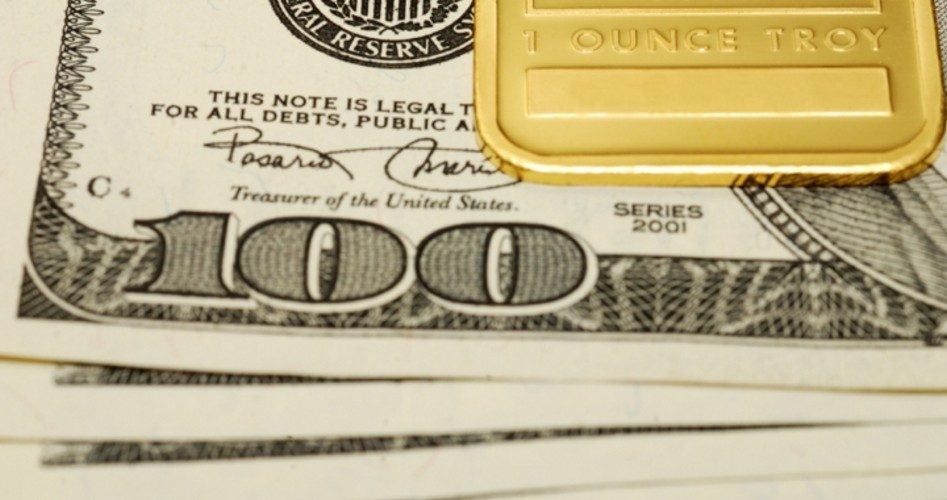
Legislation introduced in Congress recently would define the U.S. dollar as a fixed amount of gold, a move that supporters say would help stabilize the monetary system while protecting savers, workers, and investors from the ravages of inflation. If signed into law, the bill would also restrict the ability of the controversial Federal Reserve System to confiscate the American people’s wealth and manipulate the economy by expanding the currency supply. President Donald Trump has publicly supported the idea of returning to a gold-backed dollar, but the prospects for the new legislation remain uncertain.
The legislation, H.R. 5404, would “define the dollar as a fixed weight of gold,” according to a summary posted at govtrack.us. Sponsored by Representative Alex Mooney (R-W.V.), the bill would order the Secretary of the Treasury to define the U.S. dollar as an amount of gold, based on that day’s closing market price, two and a half years after the measure is enacted. It would also order all Federal Reserve Banks to make Federal Reserve notes (dollars) exchangeable for gold at the statutory gold definition of the dollar. In short, you could trade the pieces of paper in your wallet for real money.
Between when the bill is signed into law and the day that the dollar becomes officially redeemable in gold, the U.S. government would be required to disclose all of its holdings of the precious metal. It would also be required to report government purchases and sales of gold, enhancing the ability of the market “to arrive at the fixed dollar-gold parity in an orderly fashion.” Basically, the delay is aimed at ensuring a smooth transition to an honest monetary system without any sudden shocks to the system. Under the legislation, the Fed would continue to exist, but instead of dictating the money supply, it would simply administer it.
A major part of the short bill lists a series of congressional “findings.” For instance, the legislation documents the fact that the U.S. dollar has lost a staggering 96 percent of its purchasing power just since the Fed was created in 1913. For an institution that, according to statute, must seek to maintain stable prices, that is a devastating indictment. In fact, just since the year 2000, the dollar has lost almost a third of its purchasing power. Those trends continue to this day, with dollars perpetually losing value.
The legislation goes on to explain that, even under the Fed’s target of 2 percent inflation, the dollar loses half of its purchasing power every generation. And that is simply unacceptable. “American families need long-term price stability to meet their household spending needs, save money, and plan for retirement,” the legislation states. “The Federal Reserve’s trickle down policy of expanding the money supply with no demand for it has enriched the owners of financial assets but endangered the jobs, wages, and savings of blue collar workers.”
“The American economy needs a stable dollar, fixed exchange rates, and money supply controlled by the market not the government,” the bill goes on. “The gold standard puts control of the money supply with the market instead of the Federal Reserve…. Restoring American middle-class prosperity requires change in monetary policy authorized to Congress in Article I, Section 8, Clause 5 of the Constitution.”
In an opinion piece published by the Wall Street Journal, Congressman Mooney reiterated the arguments in the legislation and laid out a powerful case for returning to the gold standard. Of course, Mooney agreed with President Trump that “bad trade deals,” especially those signed with the governments of Mexico and Communist China, have played a major role in decimating America’s manufacturing sector. Employment in manufacturing shrank by a third between 2000 and 2010 after holding steady for more than 30 years, he said.
“But the Federal Reserve deserves a share of the blame, too, since its inflationary policies priced out U.S. manufacturers from global trade,” Mooney argued. “Since 2000, their prices have risen nearly 50%, compared with about 25% for German competitors — mirroring the domestic inflation rates in each country. As a result, manufacturers fled the U.S., much the way American families have fled high-tax states.”
But fixing this is not complicated. “The solution is to take control of the money supply away from the Fed and give it back to the American people — in other words, to return to the gold standard,” Mooney continued. “Gold gets a bad rap in some history books because of its misuse during the 20th century. This ignores its peacetime record of high growth and nil inflation between 1834 and 1913.”
Part of the problem in public understanding, Mooney said, is that there were two “fake” gold standards that clouded the reality. The first one, during the Depression, was aimed at causing price levels to fall, resulting in deflation. The second, which was imposed after World War II under the Bretton Woods system, only allowed foreign central banks to convert dollars into gold. “This deformity caused inflation, which skyrocketed after the Fed gained total control of the money supply in the early 1970s,” Mooney explained.
Since the link between the dollar and gold was completely severed in 1971, the American economy has “seesawed” between having too much and too little currency in circulation. That is because the Fed has been given the “impossible task” of trying to guess the market’s demand, in real time, Mooney said. The problem has only gotten worse since the 2000s came around, because now the Fed is grading itself on how its money creation is boosting financial markets. All of this has led to growing disillusionment with the dollar, to the point that now many have even embraced “ cryptocurrencies” such as bitcoin.
It has been especially devastating to those Mooney represents. “My constituents in West Virginia get little of the upside from the Fed’s money creation and most of the downside,” he argued. “They don’t benefit from speculative investment returns, but they do lose their jobs and homes when the local plant decides to close because it’s too expensive to compete from the U.S.” The current system, he added, “benefits elites.” And he is right, as leaders on both sides of the aisle have explained.
There is a better way, though. “The gold standard is equitable and puts ‘we the people’ in control of the money supply,” concluded Mooney. “That’s why it was part of America’s founding and has been a key to the country’s long economic success.” Indeed, Americans have used gold-backed money for the overwhelming majority of their nation’s history. And the results were obviously good, as America’s unprecedented prosperity illustrated.
While the bill would not abolish the Fed — something constitutionalists such as former Congressman Ron Paul have long advocated — it would significantly rein in its massive powers over the economy. “Instead the market would be in charge, the supply and demand for money would match up, and prices would be shaped by economics rather than the instincts of bureaucrats,” Mooney said. Echoing President Trump, Mooney said he believed the economy could be restored to bring success back to America. “Returning to the gold standard is a way for the president to deliver on his promise of American working-class prosperity,” Mooney concluded.
Indeed, Trump himself has touted gold-backed money on more than one occasion. “Bringing back the gold standard would be very hard to do, but, boy, would it be wonderful,” Trump explained in 2016 on the campaign trail. “We’d have a standard on which to base our money.” Vice President Mike Pence has also touted the gold standard. And from Trump’s public comments about the Federal Reserve and its manipulation of the economy, it is clear that he has at least a decent understanding of the problems with the current debt-based monetary regime and its centrally planned interest rates.
Supporters of sound money praised Mooney and his legislation. “Representative Alex Mooney is quickly becoming one of the new national leaders on the sound money issue,” said Stefan Gleason, president of Money Metals Exchange. “With his reintroduction of a gold standard bill, other legislation in the works to remove unjust federal taxation from the monetary metals, and his work on the problem of counterfeit Gold Eagles from China, Mooney recognizes there is a problem with our fake money system in America and is spurring more discussion about how gold and silver are central to the solution.”
JP Cortez, who serves as policy director for the Sound Money Defense League, highlighted the growing national effort to restore honest money sweeping the nation. “Representative Mooney’s gold standard bill is indicative of a movement that continues to gain steam,” he said. “On the state level, sound money is winning. Just this year, state legislators in Wyoming, Idaho, Kansas, and Alabama, just to name a few, have taken big strides to advance sound money measures in their states, whether it be removing sales taxes, removing income taxes, or reaffirming gold and silver as tender for payment of debts.”
John F. McManus, president emeritus of the constitutionalist John Birch Society, has been sounding the alarm about the fiat monetary regime for decades. And while he applauded the effort to “stem the horrors of debt and inflation” by defining the dollar as gold, he said it was not truly needed because there is already a definition of the dollar tied to precious metals. “Right after the Constitution was ratified and made ‘the law of the land,’ Congress passed a measure that defined the dollar as 371.25 grains of silver,” said McManus, who educated countless Americans with his Dollars and Sense presentation. “That definition has never been superseded but it certainly has been ignored.”
Meanwhile, writing at American Thinker, Pat Hall, editor in chief of RightOnPolicy.com, praised Mooney and suggested that this measure — the first attempt since 1984 to restore gold-backed money — would spark a much-needed conversation. “Rep. Mooney’s gold standard act will provide policymakers and intellectual thought leaders with the opportunity to engage in a discussion on what monetary policy is the most prosperous path forward for America,” he said, arguing that nearly two centuries of gold-backed currency was one of the key ingredients that made America the most prosperous nation in history. “Cheers to you, Rep. Mooney, for fostering this much needed conversation. With the introduction of this bill, the spirit of Jack Kemp and the original supply-side movement is once again illuminating the halls of Congress.”
As this magazine and others have documented extensively, at the state level, lawmakers and experts are hard at work in the effort to restore sound money. Numerous states have passed laws to facilitate commerce in gold and silver, with some states even defining the precious metals as legal tender. In Texas, state authorities are even working on a gold bullion depository to help sideline the Fed and expand the use of gold in trade. But for the American people to truly prosper, it is important for Congress to take action. After all, Congress created the problem by unleashing the Fed and its awesome powers over the lives of every American. It is time for lawmakers to do the right thing.
Photo: mathieukor/iStock/Getty Images Plus
Alex Newman is a correspondent for The New American, covering economics, education, politics, and more. He can be reached at [email protected]. Follow him on Twitter @ALEXNEWMAN_JOU or on Facebook.
Related articles:
Blasting “False Economy,” Trump Takes on the Federal Reserve
States Working to Restore Sound Money
Alabama Bill Would Encourage Use of Gold and Silver in Trade
Gold Standard Arguments Being Promoted Again
Russia Moving to Gold Standard?
Gadhafi’s Gold-money Plan Would Have Devastated Dollar
Texas Launches Gold-backed Bank, Challenging Federal Reserve



